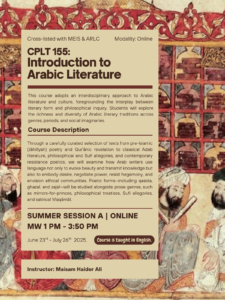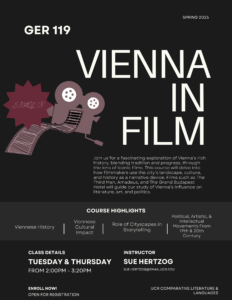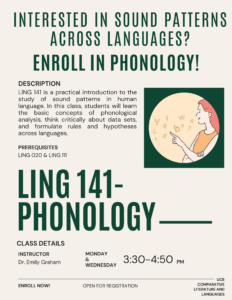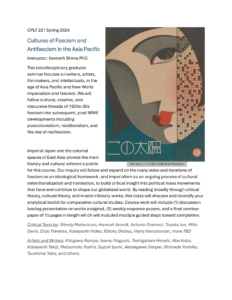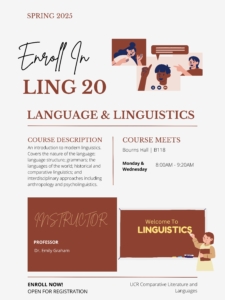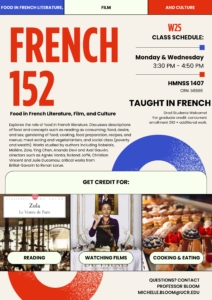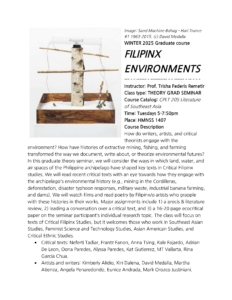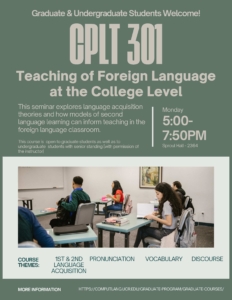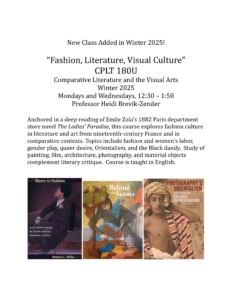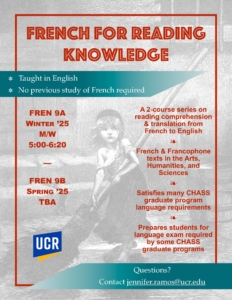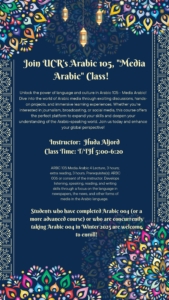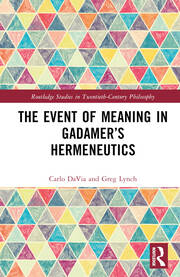
News
Summer 2025 Course Offerings
Spring 2025 Course Offerings
Isoke Atiba received the Toshiba International Foundation Fellowship
Isoke Atiba, our graduate student, received the Toshiba International Foundation Fellowship for summer research in Japan.
Isoke will also be graduating the Inter-University Center for Japanese Language Studies in June with a presentation on Sayaka Murata’s “Life Ceremony” and Biopolitics (村田さやかの「生命式」とフーコーの生政治).
Hsuan-Ying Liu published an article, "Problematizing and reexamining the notion of taking another introductory-level language class at college"
Hsuan-Ying Liu published an article, “Problematizing and reexamining the notion of taking another introductory-level language class at college: Adding students’ voices to the conversation at secondary and post-secondary levels.” AILA Review. https://doi.org/10.1075/aila.
Existing literature shows that discrepancies between the expectations of students and language instructors might discourage high school students from progressing in their language learning at college. This study aims to address such discrepancies by examining students who studied Chinese in high school but were still taking an introductory-level language course at college, with the intention of declaring a minor or major in Chinese Studies at a Midwestern university in the United States. Drawing on the concept of identity and investment, a qualitative research method was employed to address the time- and context-sensitive nature of identity and investment. Data were collected from interviews and reflection journals to reveal their investment in Chinese language learning and how they coalesced their identities as Chinese language learners in high school and college. Findings show that they firmly fought against the stereotypical assumption that taking another introductory-level class at college was for an easy A, as current world language education policy and implementation rendered them voiceless in the top-down implementation process. This present study provides new insights into the connections between investment and articulation in world language education, and invites stakeholders to reevaluate the predominant emphasis placed on language proficiency in foreign language research and education.
Keywords: investment ; Chinese as a foreign language (CFL) ; articulation ; stereotypical assumption ; identity
Read the full article here: https://doi.org/10.1075/aila.24009.liu
2024 National Chinese EXPO of Student Works
- Zeus Liao “Cooking: 瓜仔肉“ (finalist)
- Kaitlyn Huang “Singing: 我的歌聲裡“
- Joyce Wang “Painting: 莲花”
2024 National Chinese Speech Contest
- Tara He: Second Place, awarded a $75 prize (https://www.aaiceusa.com/
2024-ncsc-second-places) - Ashley Tasi: Honorable Mention
- Helen Yao: Finalist
2023 Chinese Grandmaster Language Competition
Three students – Moses Rodriguez, Alexander Lopez, and Markas Muzilla – produced a video for the 2023 Chinese Grandmaster Language Competition. They won Third in the college group, along with a $100 prize, awarded by Dahua Chinese.
Winter 2025 Course Offerings
Michelle Bloom publishes an article, “Framing Silence: The Nazi Persecution of Gay Men in Michel Dufranne and Milorad Vicanović-Maza’s Graphic Novel, Triangle Rose (2011).”
Michelle Bloom published her article, “Framing Silence: The Nazi Persecution of Gay Men in Michel Dufranne and Milorad Vicanović-Maza’s Graphic Novel, Triangle Rose (2011)” in Holocaust Studies, August, 1–28. doi:10.1080/17504902.2024.
Writer Michel Dufranne and illustrator Maza’s French-language graphic novel, Triangle rose, (2011) features a Berlin homosexual deported under Paragraph 175. In this frame narrative, the elderly survivor’s story never reaches its potential diegetic audience, Parisian students, including the protagonist’s great-grandson. The framed narrative represents the protagonist’s unarticulated memories. This narrative glitch reflects 1) the historic failure to acknowledge homosexuals as legitimate Nazi victims, and 2) ongoing homophobia in Berlin and Paris, resulting in shame, as conceptualized by Sara Ahmed and Ruth Leys. Portraylng the Nazi persecution of gay men, Triangle rose highlights an important, underrepresented chapter of National Socialist history.
Keywords: Berlin, comics, France, holocaust, Paragraph 175.
Read the full article here: https://www.tandfonline.com/doi/full/10.1080/17504902.2024.2381401
Welcome Trisha Remetir, Assistant Professor of Comparative Literature and South East Asia
Welcome to the Department. We‘re so glad that you’ve joined us as a new faculty member. Can you tell us a little bit about your background? How did you decide to become a professor? What is the story of how you came to UCR?
Thank you—I’m so glad to be here. My name is Trisha Federis Remetir. I completed a PhD in English and Comparative Literature from the University of North Carolina, Chapel Hill and from 2022-2024 was a Chancellor’s postdoctoral fellow in the Media and Cultural Studies / English Department at UC Riverside to research humanities topics of race and the environment.
Though I grew up in California, my family is from the Bicol region of the Philippines. They moved to California in the 1980s, following waves of outward migration through nursing and care work, set into place during President Ferdinand Marcos’ implementation of martial law. Growing up in the socal suburban sprawl that are the ancestral lands of the Yuhaaviatam (Maara’yam) and the Kizh/Tongva peoples, I read literature as a way to visit other places. This love of reading-as-visiting helped me think about how reading and writing could be a tool to learn more about the world, but even moreso a tool to think through the violent, complicated histories of war, coloniality, and dispossession that shape our relations to space.
Though I am a new professor to UC Riverside, this campus is a familiar place. As a middle schooler my brother took me and my siblings to Filipinx/o community events he attended while an undergraduate student here. I have deep gratitude for all of the educators at UCR (and local public spaces, like Cal State San Bernardino) who took care of and taught people close to me. So, whenever I step foot on campus I think about teaching my siblings and family friends and neighbors who went here, and their siblings and cousins too.
What are your research interests? What questions are important to you in thinking about your research, writing, and creative activities?
I am research how questions of race, gender, and power come up in discussions about the environment. Or how histories of war are woven into lands and waters. For example, when we look out into the orange groves, the first of which were planted in Riverside in 1871, whose stories are left out of the landscape? Similarly, I am motivated by communities who organize around sites of water, both here and in the Philippines. I am inspired by the work of indigenous writers, thinkers, and artists who continue to grow futures out of what states and companies might call ruins or empty space. I am also always having imaginary conversations with people who shaped the way I see the world, from the badass people who don’t care for institutions at all (universities included), to those who grow food and fiber for their communities, like Tierra Negra in Durham.
What are your teaching interests? What do you enjoy teaching? What course are you most excited to teach?
I am interested in teaching literature courses on Critical Filipinx Studies, on Southeast Asian Studies, on feminist science and technology studies (STS) work, on race and environment.
The course that I’m excited to teach this year is called “Reading Southeast Asian Stories: Neighborhoods and Storms.” In addition to getting acquainted with contemporary writers from the Philippine archipelago, the class is centered around how short stories might build worlds on a smaller scale—like a neighborhood, a block, or a village. We’ll not only talk about setting, dialogue, and characterization, but we’ll use these literary forms to feel out how class, race, disability, and colonial history in the Philippines might be worked out at the level of the neighborhood. Then, we’ll throw a wrench into the mix by considering what happens when that short story about a neighborhood is visited by a typhoon.
Can you share something about yourself that hasn’t yet come across? What things are you passionate about in your life?
Writing is my primary mode of thinking and communication, but I am also a tactile person, preferring to think through my ideas in different mediums. One day, while writing a dissertation chapter, one of my best friends came and helped me with a quilt, patched together with fabric cyanotype prints of plants around the neighborhood creek. Writing, in my understanding, is connected to embodied forms of creation, like weaving, stitching, gluing, painting, stapling. So I try to do a little bit of everything.
Carlo DaVia publishes his book: The Event of Meaning in Gadamer’s Hermeneutics
This book presents the first detailed treatment of Gadamer’s account of the nature of meaning. It argues both that this account is philosophically valuable in its own right and that understanding it sheds new light on his wider hermeneutical project.
Whereas philosophers have typically thought of meanings as belonging to a special class of objects, the central claim of Gadamer’s view is that meanings are events. Instead of a pre-existing content that we must unearth through our interpretive efforts, for Gadamer the meaning of a text is what happens when we encounter it in the appropriate way. In events of meaning the world makes itself intelligibly present to us in a manner that is uniquely and irreducibly bound up with the concrete situation in which we find ourselves. When we recognize that Gadamer thinks of meaning in this way, we are better positioned to appreciate what his wider views amount to and how they hang together. Gadamer’s accounts of interpretive normativity, the aspectival character of understanding, and the nature of essences, for example, snap into more vivid relief when we see them as outgrowths of his underlying conception of meanings as events.
Published February 6, 2024 by Routledge
Minh Nguyen publishes his article, "Bolero: Remaking Pre-1975 Music for Post-Socialist Vietnam"
Minh Nguyen publishes his peer-reviewed article, “Bolero: Remaking Pre-1975 Music for Post-Socialist Vietnam” in Rising Asia Journal.
This article studies the music of the Democratic Republic of Vietnam, as well as the music of the Republic of Vietnam, and of the diaspora. It shows that in the twenty-first century, the Socialist Republic of Vietnam has permitted many songs from the fallen Republic of Vietnam to be produced in the reunified country. More commonly known as pre-1975 songs in the diaspora, many musicians in Vietnam have dubbed the repertoire as bolero instead, highlighting the elements of Western progeny over the cultural memories of war and exodus. Using a postcolonial reading, this essay calls into question these selective revisions and recontextualizations, arguing that the musicians in Vietnam have been deploying a tactic of “self-orientalization,” or selfcriticism and cultural reformation, in order to respond to the postwar politics of state censorship. In doing so, the musicians have been able to portray themselves and the pre-1975 repertoire as being politically innocuous, which in turn offers them the leverage to work with the censors and cover politically taboo songs legitimately.
Keywords: Nhạc vàng, postwar Vietnam, Vietnamese bolero, Vietnamese diaspora, Vietnamese music
Real the full article here: https://www.rajraf.org/10282/uploads/article/1167/6_MINH_X_NGUYEN_3.pdf
Welcome to the Department. We‘re so glad that you’ve joined us as a new faculty member. Can you tell us a little bit about your background? How did you decide to become a professor? What is the story of how you came to UCR?
I am a Mississippi native, and I earned a B.S. in Secondary Education, a B.A. in French, and an M.A. in French, all from Mississippi State University. I taught French at the high school level for three years, but then decided to pursue a Ph.D. in linguistics, as I’ve always been interested in languages and their structures. I enrolled in the Linguistics program at the University of Texas at Arlington where I focused on psycholinguistics and phonology. I’ve always known that I wanted to be in academia — for me, teaching is one way in which I serve my community, and I believe that education is such an important resource at all levels. I knew that UCR was the right fit because my position allows me to focus on my teaching and investing time into my students. Additionally, I am so excited to be working at a department and university that champions the diversity of its students and equips students with the necessary tools for success.
What are your research interests? What questions are important to you in thinking about your research, writing, and creative activities?
My research interests lie in both psycholinguistics and phonology/phonetics. Broadly, the overarching question that drives my research is “What are the processes for perceiving and producing language in real time?” In the subfield of psycholinguistics, I am specifically interested in how we apply syntactic constraints during reading and investigating the areas of the brain responsible for syntactic processing. In phonology & phonetics, my research centers around imitation; specifically, I investigate which contexts are motivating for one speaker to imitate another (e.g., similar accents, intelligibility, etc.).
What are your teaching interests? What do you enjoy teaching? What course are you most excited to teach?
My teaching is centered around incorporating students’ backgrounds and lived experiences with the material. In the linguistics classroom, this is often done by using data from languages other than English that the students use outside of the classroom, and also incorporating contemporary materials so that students can see the relevance of the topic in their present lives. The classes I enjoy teaching the most are sociolinguistics and phonetics/phonology. These classes are interactive and have several real-world applications. I’m most excited to teach my phonology class this fall, since it will be my first class at UCR!
Can you share something about yourself that hasn’t yet come across? What things are you passionate about in your life?
Outside of academia, I have several hobbies that keep me busy. I’m an avid reader and have joined a few book clubs here in Riverside. I’m also a music lover — I attend concerts often, and before moving to Riverside, I played the saxophone in a community band in Dallas. Additionally, I enjoy baking and am currently making my way through a Mary Berry cookbook (I’m a big fan of the Great British Baking Show!).
Perry Link serves as an expert witness for Stanford University in a lawsuit
Over the summer of 2024, Perry Link served as an expert witness for Stanford University in a lawsuit between it and the Chinese government over whether the Stanford library can keep the diaries and letters of a man named Li Rui, who spent a life high in the Communist Party of China but disagreed with some major decisions of Mao Zedong, Deng Xiaoping, and others.
Read more on it here: US trial begins over diaries of Chairman Mao’s secretary, Diaries of Mao’s secretary at the center of a legal battle over the history of modern China

